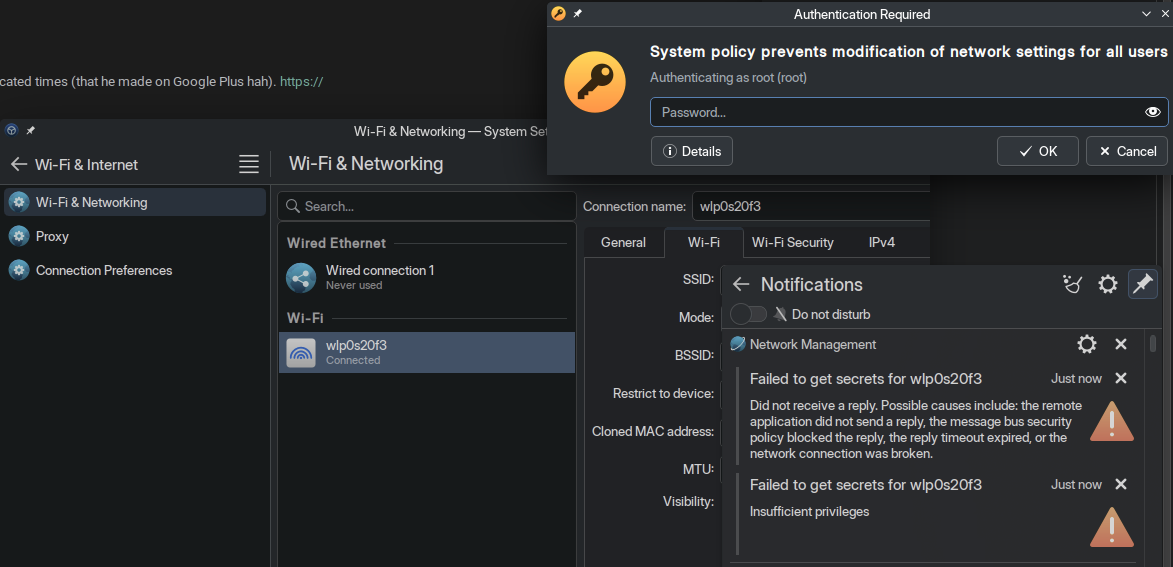Any recommendations for a linux distro that i can set up and be reasonably sure my non techy SO won’t break accidentally? The set up doesn’t have to be easy it just has to not break once I leave her alone with it. My first thought was popOS.
My plan is to have 2 profiles and not give her access to sudo. I just don’t want to have to go into it unless she needs a new program.
Fedora Silverblue.
Or really any immutable OS; they would have to go way out of their way to even edit system files, much less break the system. I just recommend Silverblue because gnome is really hard for an inexperienced user to break.
Mint.
I have my mum (67) and my partner using it.
Libre office and Firefox cover 99.9% of all the things mum actually does.
My partner uses blender, krita and audacity also.
Auto updates… Almost no tech support.
I’m gonna be the boring guy.
RedHat Enterprise Linux. (Or Rocky)
Most boring distro ever. Install it, turn on all the auto updates and be happy. Install something to take backups. Ignore any new major-releases, that laptop will die before the OS hits EOL.
Benefits:
- Boring. It’s their tool, not your plaything.
- Actually works
- Will be reasonably secure over time with minimal effort and manual intervention.
- If any commercial Linux software is required, it will most likely only be supported on RHEL or Ubuntu.
- Provides web browser and word-processing. And we don’t need anything else.
Drawbacks:
- Boring (for you)
- Not ideal for gaming
If you install anything else than RHEL-derivatives or possibly Ubuntu on a machine that someone else will use, you are both in for a world of pain. It has to ”just work” without intervention by you, and it needs to keep working that way for the next 5 years.
Source: Professionally deploying and supporting multiuser desktop Linux to a few thousand users other than myself.
Any of them. Just don’t give the root password.
Might end up in dumb annoying situations like setting up wifi requiring root and such
That is not a thing in userspace. No idea what you’re even alluding to here.

Surprising amount of stuff requires root (or used to). It reminds me of this glorious rant from Linus from his less domesticated times (that he made on Google Plus hah). https://forums.freebsd.org/threads/linus-to-opensuse-devs-kill-yourself-now.30414/
The highlight:
So here’s a plea: if you have anything to do with security in a distro, and think that my kids (replace “my kids” with “sales people on the road” if you think your main customers are businesses) need to have the root password to access some wireless network, or to be able to print out a paper, or to change the date-and-time settings, please just kill yourself now. The world will be a better place.
Oof.
This is old as hell, and on a locked down account. You don’t need restrictions like this for a personal use machine, and a base install of any distro wouldn’t have this type of issue whatsoever. It is not a modern concern.
Friend, this is from my own system I’m running right now lol.
Oh wild, I thought “No way!”, but apparently yes way as I (Tumbleweed/KDE/Standard User) get all of this which I imagine would be disorienting to non-Linux users. Just going to Wi-Fi & Networking, not attempting to make any changes even.

Don’t have this issue on archlinux. I think there is a group, which if you are part of, you can change networking settings.
[moonpie@cachyos-x8664 ~]$ groups moonpie sys network wheel audio kvm lp storage video users rfkill libvirt docker moonpie
Aurora by Universal Blue. She will be unable to break it, and it’s so freaking easy to use and install.
Semi-serious suggestion: Guix or NixOS. They’re not break-safe per se, but if they do break something, you can use the OS’ previous generations to go back to an operational state. Just… don’t let them use the commands that delete older generations.
(Semi-serious because they’re both not exactly mainstream and not eactly conventional in their setup.)
Yep, NixOS as a base + some Flatpak store for installing apps. In fact, use impermanence to just drop all OS state apart from logs, network settings and flatpaks. That way, “turn it off and then on again” will almost always work to fix the OS.
I’ve got my wife and 5 year old on slackware. They wouldn’t know how to screw it up if they wanted to!
Now that’s an extreme choice :D
Doing a lot of tech support, don’t you?
Nope! Everything just works and it’s rock solid. It’s also been my daily driver for over 20 years.
I was doing a lot of tech support when my wife was on endeavouros and my daughter was on bazzite. Tbf, my problems with bazzite were probably down to me not understanding the immutable distro concept.
I can absolutely expect Slackware to be solid; my concern is about user-friendliness :D
Not the easiest distro out there.
On the topic of immutable distros, I more or less understood them and kind of managed to work fine with them, but, honestly, I feel all they do is enforce a certain way to interact with the system that makes screwing it up very hard - but on the other hand, introduces a slew of non-standard and sometimes complicated solutions newbies won’t understand (even for veterans it takes a while to get a grasp on them). If you follow the same pipeline on a mutable distro, you get the same stability plus the ability to do a lot of things without jumping through the hoops.
Right now I ended up on classical non-atomic Fedora for this reason. It features a lot of safe practices from immutable distros - system snapshots before updating, prioritizing flatpaks, container-oriented terminal able to work with Distrobox among all other things - but at the same time it’s a mutable distro able to work with everything else.
I think Slackware’s reputation for being difficult dates back to the 90s when all linux was difficult. Slackware has evolved just like everyone else, just differently. It’s easy to install, and works like any other kde plasma based distro if you choose the default full install.
The two biggest differences are no systemd and package management. Slackpkg functions somewhat like apt-get, but only for official packages and updates. Everything else can be installed with slackbuild scripts that can be automated with sbopkg. This process is similar to using the AUR with a helper like yay. And I have some flatpaks installed too.
Fair!
But still, an installation process that doesn’t involve a package manager is a bit of a pain, comparatively. Flatpaks may certainly be very helpful, though.
There are tools to download, compile and install packages! Whether or how you use them is left up to the slacker. I use them, but I scrutinize most deps so that I’m not adding support for features I won’t use.
I see, yep.
Thanks for the response!
Nixos with whatever defaults you don’t want her touching, then she can use nix profiles to install extra software if she wants
Has “non techy” evaded you ?
In fairness, there are attempts to make Nix user-friendly, such as SnowflakeOS, featuring a lot of improvements including a graphical app store etc, but those are alpha and not ready for an average user.
Any immutable distro would do I guess
That is, if you have experience running immutable distros yourself and are able to serve as a tech support for them should they ever need it.
A lot is different under the hood, and general Linux knowledge doesn’t always help.
Fedora Atomic desktops, specifically Kinoite with KDE6 works well for me, and is basically unbreakable due to the way it works.
I vote the same, but I’d suggest a uBlue spin of the Fedora Atomic desktops. They have better defaults (all batteries included, as they say) and are easier to use overall IMHO. Bluefin and Bazzite are both great options, and both offer KDE and Gnome variants.
Edit: TIL the KDE version of Bluefin is called Aurora.
BTW, uBlue is getting some big recognition lately. They have been on the Fedora Podcast (official) and Framework Laptops has official instructions on their website for installing Bluefin and Bazzite.
Gotta be slightly careful with those spins though because there is near-zero documentation.
They have significant documentation, and anything not covered here is just part of Fedora atomic:
That is a different spin than the original comment, which is why I made that commen.
https://docs.getaurora.dev/ https://docs.projectbluefin.io/ aurora has one small page of documentation total unless you click on the logo which suddenly opens a hidden unlabeled drawer with sparse docs. Bluefin has even less. I consider this near-zero documentation. So how would OP’s non-techy girlfriend (or someone who has only heard of aurora and bluefin from this thread) know to go to bazzite, a completely different project to most people, to debug their completely different OS? Because googling “ublue aurora flatpak won’t install” literally gives this page: https://docs.getaurora.dev/guides/software/ which is literally almost useless.
Bazzite’s documentation has gotten way better since I installed it (they had almost nothing on rpmostree commands when I did), but I don’t believe everything in the documentation for bazzite applies the same to aurora and bluefin, especially with differences in pre-installed non-layered gaming defaults vs working with flatpaks will be not even close to the same.
Also fedora knoite has little documentation https://docs.fedoraproject.org/en-US/fedora-kinoite/. It has enough to get you started and installed, but that is about it. It has one single line of code about
rpmostreefor example, not even anything about installing an RPM not in fedora’s limited repos.I didn’t say any of it was bad. Just that you have to be slightly careful with using those for non-techy users because the documentation just isn’t there yet.
Bluefin has even less. I consider this near-zero documentation.
What do you feel is missing from the documentation, can you be specific? You’re examples are too generalized to be actionable.
Fedora is a bit too eager to deliver new updates IMO, especially KDE. As much as I love KDE, their .0 releases have had serious bugs several times in a row now. It’s always better to wait for .1 patch with Plasma. It may be hard for the user to break Kinoite, but it won’t save them from bugs.
Fedora’s mission have always been to push new stuff when it’s “mostly ready” at the cost of inconveniencing of some users, so I wouldn’t recommend it for non-tech-savvy people.
I know people say that it’s 100% stable for them (as they do for Arch, Tumbleweed, Debian Sid, etc) but that’s survirorship bias. As any bleeding edge distro, Fedora has its periods of stability that are broken by tumultuous transitions to the new and shiny tech (like it was with Pipewire, Wayland default, major DE upgrades, etc). During these times some people’s setup will break and you don’t know ahead of time if it will be yours.
Pick one of the
stablechannels from Universal Blue. You get the Fedora atomic goodness, but “ready” rather than “mostly ready”.Does it use the same flawed approach as Manjaro by indiscriminately delaying all updates (including critical security fixes)?
It would be whatever Fedora is doing in stable, but that seems unlikely. I’m sure the internet has the answer.
I’ve been on the
latestbranch for a year and it’s been rock solid across 2 different laptops.
deleted by creator







